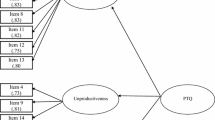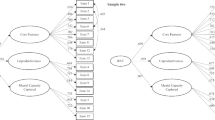Abstract
Repetitive negative thinking (RNT) has been shown to be an important vulnerability factor for a variety of emotional problems. Recently, the Perseverative Thinking Questionnaire (PTQ) was developed as a content-independent measure of RNT in adults, which allows research into this process from a transdiagnostic perspective. The current study describes the construction of a child-appropriate version of the instrument and provides initial evidence for its reliability and validity. Both a one-factor model and a three-factor higher-order model were found to adequately fit with the data but the more parsimonious one-factor model was retained for further analyses. The unidimensional PTQ-C scale showed excellent internal consistency and its validity was supported by substantial correlations with other measures of repetitive thinking as well as with symptom levels of depression and anxiety. Finally, as expected, regression analyses suggested that the PTQ-C scale captures the general repetitive negative thinking associated with anxiety and depression, whereas measures of worry and brooding tap additional content-related aspects of these symptom dimensions.
Similar content being viewed by others
Notes
Unfortunately, we did not collect data on racial/ethnic background or SES. However, the population of children in the participating schools is predominantly Caucasian and can be considered as representative of the Belgian population in terms of SES.
We thank an anonymous reviewer for this valuable suggestion.
References
Abela, J. R. Z., Brozina, K., & Haigh, E. P. (2002). An examination of the response styles theory of depression in third and seventh grade children: a short-term longitudinal study. Journal of Abnormal Child Psychology, 30, 513–525.
Abela, J. R. Z., Vanderbilt, E., & Rochon, A. (2004). A test of the integration of the response styles and social support theories of depression in third and seventh grade children. Journal of Social and Clinical Psychology, 23, 653–674.
Birmaher, B., Brent, D., Chiappetta, L., Bridge, J., Monga, S., & Baugher, M. (1999). Psychometric properties of the screen for anxiety related emotional disorders (SCARED): a replication study. Journal of the American Academy of Child and Adolescent Psychiatry, 38, 1230–1236.
Birmaher, B., Khetarpal, S., Brent, D., Cully, M., Balach, L., Kaufman, J., & Neer, S. M. (1997). The screen for child anxiety related emotional disorders (SCARED): scale construction and psychometric characteristics. Journal of the American Academy of Child and Adolescent Psychiatry, 36, 545–553.
Borkovec, T. D., Robinson, E., Pruzinsky, T., & De Pree, J. A. (1983). Preliminary exploration of worry: some characteristics and processes. Behaviour Research and Therapy, 21, 9–16.
Chorpita, B. F., Tracey, S. A., Brown, T. A., Collica, T. J., & Barlow, D. H. (1997). The assessment of worry in children and adolescents: an adaptation of the Penn state worry questionnaire. Behavioral Research and Therapy, 35, 569–581.
Ehring, T., Raes, F., Weidacker, K., & Emmelkamp, P. M. G. (2012). Validation of the Dutch version of the perseverative thinking questionnaire (PTQ-NL). European Journal of Psychological Assessment, 28, 102–108.
Ehring, T., & Watkins, E. R. (2008). Repetitive negative thinking as a transdiagnostic process. International Journal of Cognitive Psychotherapy, 1, 192–205.
Ehring, T., Zetsche, U., Weidacker, K., Wahl, K., Schönfeld, S., & Ehlers, A. (2011). The perseverative thinking questionnaire (PTQ): validation of a content-independent measure of repetitive negative thinking. Journal of Behavior Therapy and Experimental Psychiatry, 42, 225–232.
Harvey, A. G., Watkins, E., Mansell, W., & Shafran, R. (2004). Cognitive behavioural processes across psychological disorders. Oxford: Oxford University Press.
Jöreskog, K., & Sörbom, D. (2007). LISREL 8.80. Chicago: Scientific Software International, Inc.
Kashdan, T. B., & Roberts, J. E. (2007). Social anxiety, depressive symptoms, and post-event rumination: affective consequences and social contextual influences. Journal of Anxiety Disorders, 21, 284–301.
Kovacs, M. (2003). Children’s depression inventory: technical manual. New York: Multi-health Systems.
Langlois, F., Freeston, M. H., & Ladouceur, R. (2000). Differences and similarities between obsessive intrusive thoughts and worry in a non-clinical population: Study I. Behaviour Research and Therapy, 38, 157–173.
Meyer, T. J., Miller, M. L., Metzger, R. L., & Borkovec, T. D. (1990). Development and validation of the Penn state worry questionnaire. Behaviour Research and Therapy, 28, 487–495.
Nolen-Hoeksema, S. (2004). The response styles theory. In C. Papageorgiou & A. Wells (Eds.), Depressive rumination: nature, theory and treatment (pp. 107–123). Chichester: Wiley.
Nolen-Hoeksema, S., & Morrow, J. (1991). A prospective study of depression and posttraumatic stress symptoms after a natural disaster: The 1989 Loma Prieta earthquake. Journal of Personality and Social Psychology, 61, 115–121.
Raes, F. (2012). Repetitive negative thinking predicts depressed mood at 3-year follow-up in students. Journal of Psychopathology and Behavioral Assessment, 34, 497–501.
Rood, L., Roelofs, J., Bögels, S., & Alloy, L. (2010). Dimensions of negative thinking and the relations with symptoms of depression and anxiety in children and adolescents. Cognitive Therapy and Research, 34, 333–342.
Schermelleh-Engel, K., Moosbrugger, H., & Müller, H. (2003). Evaluating the fit of structural equation models: test of significance and descriptive goodness-of-fit measures. Methods of Psychological Research Online, 8, 23–74.
Speckens, A. E., Ehlers, A., Hackmann, A., Ruths, F. A., & Clark, D. M. (2007). Intrusive memories and rumination in patients with post-traumatic stress disorder: a phenomenological comparison. Memory, 15, 249–257.
Treynor, W., Gonzalez, R., & Nolen-Hoeksema, S. (2003). Rumination reconsidered: a psychometric analysis. Cognitive Therapy and Research, 27, 247–259.
Verstraeten, K., Vasey, M. W., Raes, F., & Bijttebier, P. (2010). Brooding and reflection as components of rumination in late childhood. Personality and Individual Differences, 48, 367–372.
Willem, L., Bijttebier, P., Claes, L., & Raes, F. (2011). Rumination subtypes in relation to problematic substance use in adolescence. Personality and Individual Differences, 50, 695–699.
Acknowledgment
This research project was sponsored by Grant G.0923.12 from the Fund of Scientific Research-Flanders to the first author.
Conflict of Interest
None of the authors has any conflicts of interest to declare.
Experiment Participants
The study procedures were approved by the ethical review board of the Faculty of Psychology and Educational Sciences of KU Leuven.
Author information
Authors and Affiliations
Corresponding author
Rights and permissions
About this article
Cite this article
Bijttebier, P., Raes, F., Vasey, M.W. et al. Assessment of Repetitive Negative Thinking in Children: the Perseverative Thinking Questionnaire – Child Version (PTQ-C). J Psychopathol Behav Assess 37, 164–170 (2015). https://doi.org/10.1007/s10862-014-9446-x
Published:
Issue Date:
DOI: https://doi.org/10.1007/s10862-014-9446-x




